Last week we had the pleasure of investigating living in homes on wheels, this week we further investigate alternative ways of living in Skattungbyn, Sweden. Maybe you will find something in Skattungbyn that might inspire a change in your own life?
Text: Domi. Photo: Agata Mazgaj, AnnVixen, Daniel Zetterström. Tellus Think Tank 2016-02-17.
The village of Skattungbyn has about 350 inhabitants and maybe half of them have at one time taken a course at
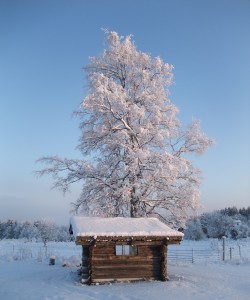
Mora Folk School. After having finished the course, some remain in the village and keep exploring alternative ways of living.
ABOUT TELLUS THINK TANK…read
What fascinates me most is not the beautiful landscape, the fresh air and the harmonious atmosphere of the village but the insight that it is possible to live quite differently to what I am used to from my suburb life in Stockholm. f
- A person in Skattungbyn can live for less than 200 Euros a month, including rent, food and phone costs – further ahead in this article.
In most parts of Sweden the normal monthly rent for a one roomed apartment would be between 300-700 Euros, food costs of about 150 Euros per person to be added. City life is much more expensive! - Several people in Skattungbyn have chosen not to work full time or have more radically decreased the amount of hours they work a week.
In most other parts of Sweden adults work full time, regardless of marital status. Generally we talk about the treadmill of the 24 hour day divided into:
8 hours work, 8 hours sleep and 8 hours for organising one’s life so one can keep on working – i.e. picking kids up from school, commuting to and from work, cleaning, washing and shopping.

How can the differences be so big between a group of people in the village of Skattungbyn and the rest of the western world?
The answer is that there are several things that contribute to the possibility of living inexpensively in Skattungbyn:
- Land is cheaper than in urban developed areas.
- The trend for Tiny Homes on wheels – see last week’s article
- Good prerequisites to grow or buy inexpensive food and other things that might be needed in special types of local shops – read more below
Markus arrives at Skattungbyn
Markus Skoog, 34 years old, left the rush of the city for an alternative life in Skattungbyn.
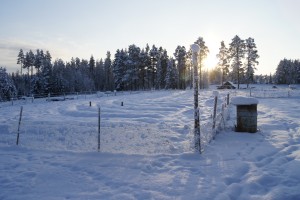
He grew up in a suburb of Stockholm and soon understood that his high school teacher’s diploma would never enable him to buy his own apartment in the Stockholm area. He changed course and started off as a carpenter’s apprentice and was soon making more money but the life he led, building small exclusive apartments in the city, didn’t give him the satisfaction he was looking for. Markus searched for ways of living closer to nature and shortly after was accepted to the Mora Folk School.
Mora Folk School
The course at Mora Folk School followed the farming year and started in January, continuing throughout the season. Sessions were held in growing and preserving food, how to eat more nutritiously and lessons in different crafts such as weaving and making homespun clothes. The pedagogical narrative of the school is sustainability and global human rights.

-During the course, my fellow students and I came to understand just how much work lays behind just one t-shirt sold by the retail industry, says Markus.
Markus initially moved into the dorms of the school dorms but soon he and a couple of other fellow students decided to build their own homes on wheels, according to the Skattungbyn-way.
The most important lessons for Markus where on how to grow food and living in collectives can not be done successfully with just anyone. One needs to be selective when choosing with whom to live.
What kind of people have chosen to investigate alternative ways of living in Skattungbyn?
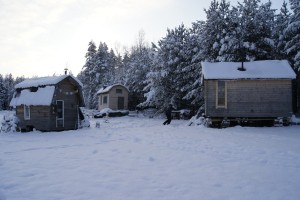
Skattungbyn villagers that investigate alternative ways of living have often attended the Mora Folk School. Markus first calls them “hippies”, “greens” or “alternatives” but in the next breath he says people are difficult to group.
Persons that after school succeed in finding a job in the area often stay. They start off living in the dorms at the school and some move into Tiny Homes on wheels, others buy their own land. After a couple of years most look for a somewhat more spacious way of living and often keep a strong alternative focus in their lives.
We make a short stop at the home of Anna Berggren that came into possession of an old farm high up on the south slopes of Skattungbyn. She has an amazing view over the nature of
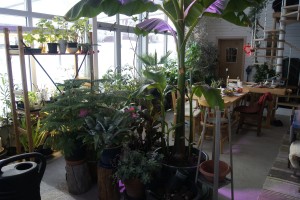
Orsa Finnmark and herds her sheep on the mountain. Anna recently built out the old farm with an orangery that gives her lemons in the midst of winter!
Markus tells me about the 86 year old woman who down-sized as she got older and moved into a home on wheels to avoid an old peoples home.
-She was the most hard-core person of all Tiny Home dwellers, says Markus Skoog. He was very impressed by
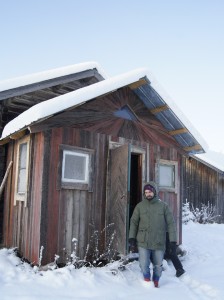
her. She only had about 7 m² which gave her space for a bed, a small cabinet and a wood stove. She lived there without electricity and running water and loved it!
Markus has his home on wheels on a plot of land that belongs to FrejaLina. FrejaLina recently bought the estate of Flurlundar farm and started a collective on the property. Today there are five persons living in the mother house of the estate and another four residents that live in their own homes on wheels. Some of them have access to electricity and fresh water, and some of them live totally “off grid”.
Life at Flurlundar farm reminds me of my university dorm where we also had a very positive fellowship community going on with film evenings etcetera. There are several differences here such as, members of the collective are involved in their community farm and also take turns in cooking vegetarian dinners for each other.
There are no children in the collective, yet. One person owns the dog, Birk, that is one of the most cherished dogs I have ever seen – he has a lot of different people to take him for a walk!
Dumpster diving for food
Most of the people who have chosen an alternative lifestyle in Skattungbyn eat vegetarian and buy or grow their own food. Markus tells me that there are some that dumpster dive for their food, meaning that they “dive” into dumpsters behind food stores for food that has past its best date. Markus avoids dumpster diving as some locals find it annoying. He was once invited to a friend for a really lovely salmon ceviche dinner, and learnt that the salmon had been found in a dumpster!
Are the alternative of Skattungbyn idlers?
Skattungbyn is becoming known to be “hippie” and is famous in the Swedish alternative circle but the village also has a lot of inhabitants that do not count themselves as “alternative”. Markus says that there are some prejudiced ideas circling about the alternatives, such as that they probably idle and live on welfare. He strongly opposes this.

Markus says that it is possible to live very inexpensively in Skattungbyn, if one wants to, and that neither a full time job or welfare is needed to survive. A friend lived during a longer period for under 50 Euros a month. How could he do that? He took care of people’s houses when they were abroad, dumpster dived for food, worked for food doing things like chopping wood. One job gave him a couple of Euros that he put used for his mobile phone subscription.
-It is difficult for some to understand that such inexpensive living is possible, says Markus, which might lead some to believe that welfare is in the picture, which it is mostly not.
Some people he knows work a couple of hours a month in the Folk School and live for under 200 Euros a month. Markus lived with costs less than 180 Euros a month, during a period. Costs included rent for his Tiny Home on wheels, electricity, water, mobile subscription and food.
-Vegetarian drygoods are pretty cheap, Markus explains with a smile!
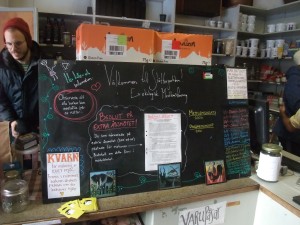
Today Markus works fulltime at a refugee camp in the neighboring village of Orsa and estimates that his monthly living costs have increased to 500 Euros as he needed a car for work. Some of his friends also work at the refugee camp and others work at the local hospital or in youth care.
There are several “shops” in Skattungbyn and none of them can be considered normal but they all help the inhabitants to live more inexpensively!
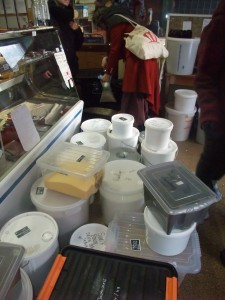
Skattunge Handel was once the only food store of the village but was deemed unprofitable and about to be closed. To avoid having to drive 15 miles for food or gas the villagers took over shop and founded a cooperative association. Today the shop holds the same assortment as a small food store. It has employees to run it but much of the administration is done by the co-op members.
Slåttergubben is the second food store in the village. It is also co-owned by some of the villagers but classed as a procurement association. The shop buys large sacks of locally grown food or European organic food. Customers bring their own packages to fill.
The shop is very much cheaper than a normal store. It is only open between 13 pm and 15 pm on Saturdays so that it doesn’t compete with Skattunge Handel. The village is too small for competition but big enough for cooperation it seems!
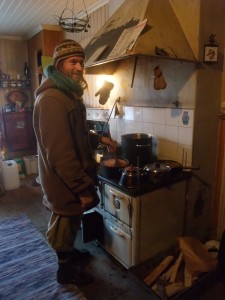
Hansen’s House is run by the Swedish study association for study circles and theatre groups. On Saturday afternoons Hansen’s House becomes a meeting places for the alternatives of Skattungbyn they then hold a “folk kitchen”, serving vegetarian meals to anyone that might be interested. The kitchen is financed by donations from both guests and donors.
The Free Shop – this might technically not be a shop but rather a place where villagers can bring unneeded clothes, books or utility articles and also help themselves to anything that they find. Markus Skoog tells me that the Free shop isn’t owned by anyone and doesn’t have a formal administration but is run by anyone who is interested. We meet Malin who
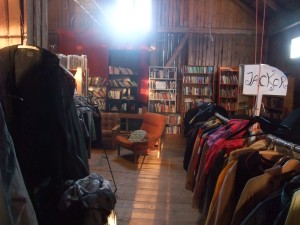
currently has chosen to organise the Free shop, it looks absolutely lovely and pittoresque!
Interestingly enough, all of the shops in the village are non-profit making and run either by a cooperative or by driving spirits helping other villagers to a more inexpensive life!
Some people in Skattungbyn do their Saturday shopping tour by first visiting the two food shops and then passing the Free shop to either pick up or leave stuff off and then continue to Hansen’s House for a meal. The latest news is the recently opened tool library where villagers can borrow good quality tools.
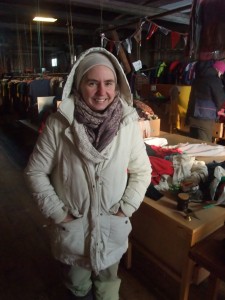
Markus and the blogg
Markus started the blog “Att Leva det Levande Livet”.
-Because “life must be able to be better than this”, he smiles!
He wanted to document his own learnings of alternative living and share it with others that might be interested!
What about the farming?
At Flurlundar farm the collective recently laid the foundation for a 2000 m2 farming plot. The soil isn’t as good as it could be yet and the collective is planning for an all organic farm. It might take up to 8 years before the yields hit their highs and make the collective self sufficient in beans, peas, red
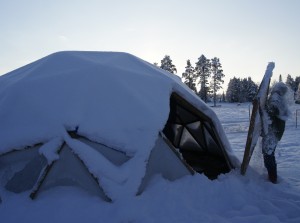
cabbage, kale, artichokes, onions, squash, pumpkins and potatoes. They also built a greenhouse, “The Dome”, to be able to grow their own chili, basil, cucumber and tomato.
A second greenhouse will soon provide the collective by providing the possibilities of biannual crop rotation to avoid pests. Most of what they know about growing food was learnt from their very appreciated teacher Patrik Ytterholm at Mora Folk school.
Will Markus always live like this?
Markus is happy in his Tiny Home on wheels but is planning to buy his own plot of land and build a real house on it. He also has plans to allow others to move onto his property to
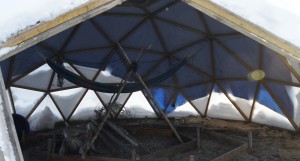
gain a passive income from rent. He doesn’t mind working but wants to do things that matter to him such as giving a course this summer on how to build you own Tiny Home on wheels!
The visit to Skattungbyn has been an eye-opener showing that life can be more free and not so structured as life often is in urban areas. There are of course pro’s and con’s with every lifestyle but Tellus Think Tank is happy to understand this alternative!
Next week we investigate the development of Stockholm as a green and environmentally friendly city from a traffic perspective, would you like to be notified when it is available, click here!
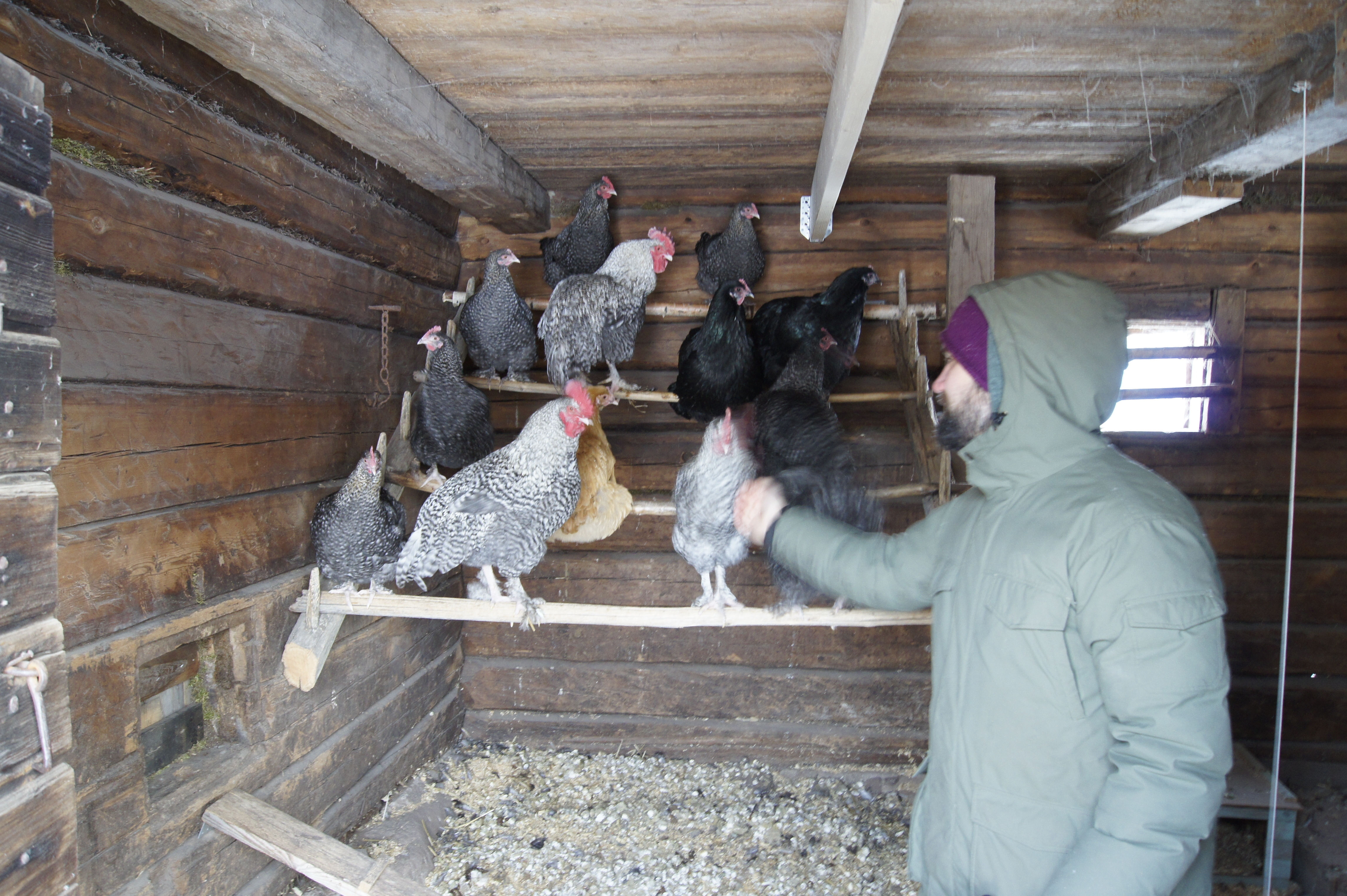





I’m looking for places to stay in Skattunbyn and are a long term traveller of 4,5 years.
My nr is 0722087755.
I’m interested to coming to your village and are finding a place to settle in Sweden. I’m currently in The south and are basically looking to make some friends in Sweden.
I’m a pretty disconnected from soceity type of person and are looking for people who understand this :).